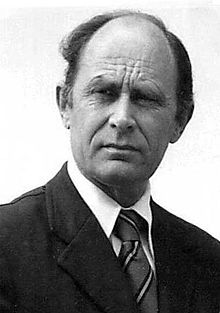I’m not an expert on the works of Antony C. Sutton (1925-2002), but I hope to be one day, and this post will explain why.
Deep within the second volume of his magnum opus, Sutton posed the following alternative:
To subsidize and support a system that is the object of massive military expenditures is both illogical and irrational. . . . it calls into question not only the ability and the wisdom but indeed the basic common sense of the policymakers. The choice is therefore clear: either the West should abandon massive armaments expenditures because the Soviet Union is not an enemy of the West, or it should abandon the technical transfers that make it possible for the Soviet Union to pose the threat to the Free World which is the raison d’être for such a large share of Western expenditures. Western Technology and Soviet Economic Development, 1945-1965, Stanford, Hoover Institution, 1968, p. 400.
 When I chanced upon Sutton’s trilogy at a public library in the early ’70s, I was still viewing the world through Herbert Aptheker’s red-tinted spectacles. The massive amount of evidence of technology transfer that Sutton had discovered, organized, and published—under the imprint of Stanford University’s Hoover Institution—cohered with neither the Communist worldview I then held nor my anti-Communist one a few years later.
When I chanced upon Sutton’s trilogy at a public library in the early ’70s, I was still viewing the world through Herbert Aptheker’s red-tinted spectacles. The massive amount of evidence of technology transfer that Sutton had discovered, organized, and published—under the imprint of Stanford University’s Hoover Institution—cohered with neither the Communist worldview I then held nor my anti-Communist one a few years later.
For Sutton proved that for at least fifty years capitalists had sold their supposed mortal enemies helming the Soviet Union much more than the proverbial rope with which to hang them (thereby fulfilling a prediction apocryphally attributed to Lenin).

 His wife, Margit, had been an actress, and she had great beauty, intelligence, and presence as well.
His wife, Margit, had been an actress, and she had great beauty, intelligence, and presence as well.





 Earlier that year I had dropped into Hook’s office at 25 Waverly Place to ask about the class. As a young Red, I couldn’t pass up the chance to meet this infamous anti-communist in the flesh.
Earlier that year I had dropped into Hook’s office at 25 Waverly Place to ask about the class. As a young Red, I couldn’t pass up the chance to meet this infamous anti-communist in the flesh.





 Malcolm X’s contribution to the erosion of American political rhetorical standards lives on, most recently in President Trump’s speech at a rally in Tennessee. But at least he was characterizing the expediency of his enemies.
Malcolm X’s contribution to the erosion of American political rhetorical standards lives on, most recently in President Trump’s speech at a rally in Tennessee. But at least he was characterizing the expediency of his enemies.